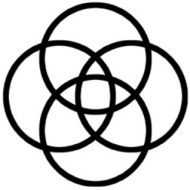“Why do you think the Japanese concept of ikigai—your reason for being—is so popular in India?” is one of the questions we get asked the most from all over the world. Our intuition told us that there must be something in common between the Japanese way of life and the Indian way of life, so we’ve responded to the question by saying: “Indian culture is the wellspring from which many Japanese traditions emerged a long time ago. It seems that both people in Japan and people in India consider the purpose of our lives to be of utter importance.”
But in our quest to understand how to have a good life, and the role of one’s purpose in it, we pursued a more concrete answer.
After reading dozens of books on Indian culture and traveling around India talking with thousands of readers of our previous books, we encountered a key concept from Hinduism: purushartha.
It can be translated as “the objective of human beings” or as “the purpose or goal of a human being.”
Purushartha (पुरुषार्थ) is a Sanskrit word made up of two parts:
PURUSHA (पुरुष): “spirit” or “immaterial essence of a human.”
ARTHA (अर्थ): “meaning,” “purpose,” “objective,” or “goal.”
In order to live in accordance with purushartha and to have a fulfilling life, there are four areas—known as the four purusharthas—that we need to cultivate:
- Dharma is a word that has many meanings. At a very general level it means “what makes the universe exist,” “the right way of living,” or “the eternal nature of reality.” It includes the moral values, duties, rights, and virtues that each individual pursues in order for harmony to prevails in the world and in order to realize one’s true nature.
o You can ask yourself: What does the world need from me? Why do I exist? - Kama refers to the pleasures of the senses and the enjoyment of what is beautiful in life. It is also about desires, emotions, and love.
o You can ask yourself: What do I love doing? What do I want? - Artha is what you need to do in order to sustain your life. It is about bringing prosperity to yourself, your family, and your community. In a modern sense it is about your job, your career, your financial security, and wealth in general.
o You can ask yourself: What do I need to sustain my life? What can bring wealth to me and my loved ones? - Moksha means self-realization, liberation, and freedom. In some schools of thought we reach a state of moksha when we are free from death and rebirth. In others it means simply being in a state in which you have the freedom to work on your self-realization. In modern terms it could be associated with the top of Abraham Maslow’s hierarchy of needs. Who are you in your most essential sense? Try to think how you would define yourself without mentioning your name, your job, things you identify with, your country…
o You can ask yourself: Who am I? Who am I in the truest sense?
